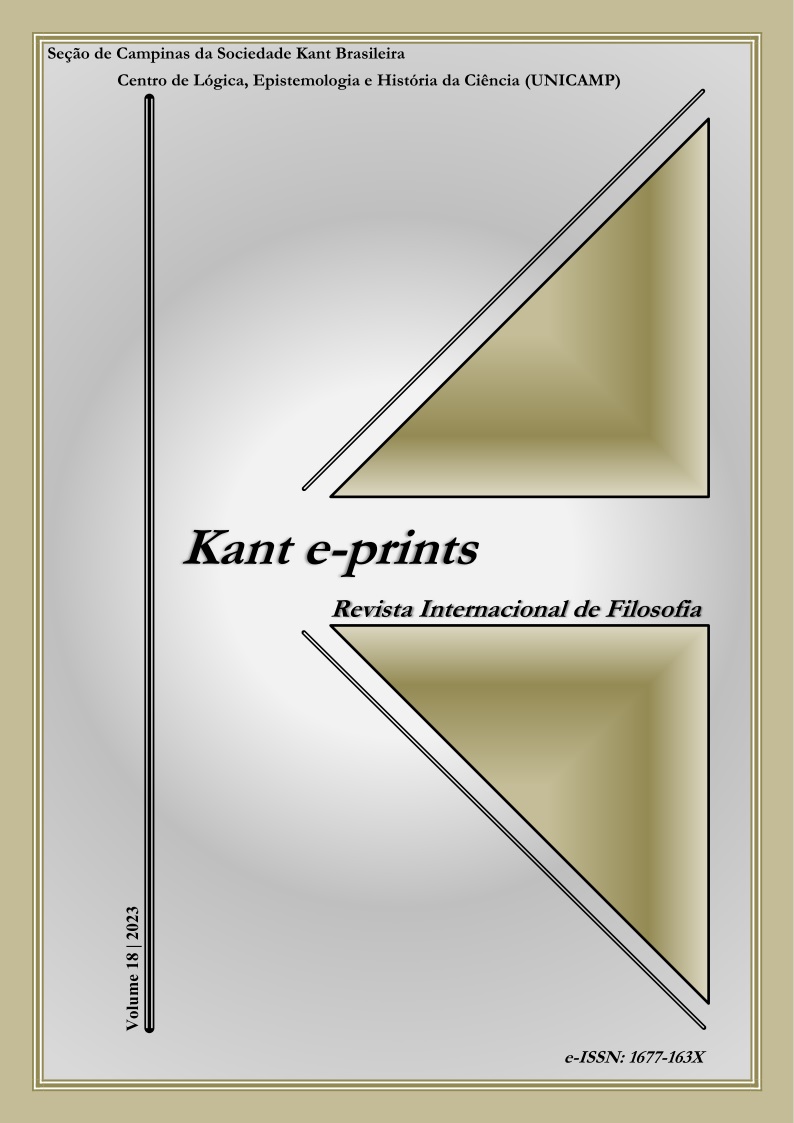Abstract
For many interpreters, especially the more traditional ones, Kant belongs to the Enlightenment tradition of an “appreciation of natural religion”, which denies making any appreciation, and even less any “depreciation”, of Christianity (SF, 7: 08). He intends only to submit religion to the supreme court of reason. But, according to other interpreters, mainly the more recent ones, although Kant believes that the rational moral core of religion is independent of historical religions and could eventually be present in many of them, Christianity plays a more than illustrative role in his reflections. Our hypothesis in the present article is that this characterizes an ambiguity of Kant’s try to reduce religion to morality, and it can be more explicitly found in his difficulties in providing formal proof of radical evil and of the objective reality of its overcoming in the figure of Christ, so in the first and second part of the book Religion within the Limits of Reason Alone. In the third and fourth parts, this ambiguity diminishes, and Kant turns more emphatically critical of historical religions.
References
Baillie, J. (1939). Our Knowledge of God. Oxford University Press; Humphrey Milford.
Bento XVI. (2007). Spe Salvi. Libreria Editrice Vaticana. Recuperado em 06 de março de 2017, de https://www.vatican.va/content/benedict-xvi/pt/encyclicals/documents/hf_ben-xvi_enc_20071130_spe-salvi.html
Cassirer, E. (1997). A ideia de tolerância e a fundação da ‘religião natural’. In E. Cassirer, A Filosofia do Iluminismo (pp. 220–245). Editora da Unicamp.
Cohen, H. (2004). La religión de la razón desde las fuentes del judaísmo. Anthopos.
Davidovich, A. (1993). Religion as a Province of Meaning: The Kantian Foundations of Modern Theology. Fortress Press.
Dorrien, G. (2012). Kantian Reason and Hegelian Spirit: The Idealistic Logic of Modern Theology. John Wiley & Son.
Firestone, C. L.; Jacobs, N. (2008). In Defense of Kant’s Religion. Bloomington & Indiana University Press.
Godlove, T. F. (2014). Kant and the Meaning of Religion: The Critical Philosophy & Modern Religious Thought. I.B. Tauris& Co.
Green, R. (1992). Kierkegaard and Kant: The Hidden Debt. State University of New York.
Hare, J. E. (1996). The Moral Gap: Kantian Ethics, Human Limits, and God’s Assistance. Oxford University Press.
Heck, J. N. (1999). O princípio do amor-próprio em Kant. Síntese, 26(85).
Kant, I. (1902-). Kant’s gesammelte Schriften. De Gruyter.
Kant, I. (1985). Resposta à pergunta: Que é “Esclarecimento”? (Aufklärung?). Tradução de Floriano S. Fernandes. In I. Kant, Immanuel Kant: Textos Seletos (2a ed., pp. 100–117). Vozes.
Kant, I. (2008). A religião nos limites da simples razão (A. Morão, Trad.). Edições 70.
Kant, I. (2017). O conflito das faculdades (A. Morão, Trad.). Edições 70.
Kroner, R. (1914). Kants Weltanschauung. Mohr.
James, W. (2017). As variedades da experiência religiosa: um estudo sobre a natureza humana (2a ed.). Cultrix.
Mccarthy, V. (1982). Christos as Chrestos in Rousseau and Kant. Kant-Studien, 73(2), 191–207.
Michalson, G. E. (1979). The Historical Dimensions of a Rational Faith: The Role of History in Kant’s Religious Thought. University Press of America.
Palmquist, S. R. (2000). Kant’s Critical Religion. Routledge.
Paul, L. (1869). Kant’s Lehre vom Idealen Christus: Ein Vergleich mit der Christologie der Kirche. Verlag von Carl Schröder & Comp. [printed by Forgotten Books, 2018].
Quinn, P. L. (1984). Original Sin, Radical Evil, and Moral Identity. Faith and Philosophy, 1(2).
Quinn, P. L. (1990). Saving Faith from Kant’s Remarkable Antinomy. Faith and Philosophy, 7(4).
Ranke-Heinemann, U. (1992). Nein und Amen. Mein Abschied vom traditionellen Christentum. Heyne.
Rossi, P. J., & Wreen, M. (1991). Kant’s Philosophy of Religion Reconsidered. Indiana University Press.
Santos, L. R. (2017, maio/ago.) Kant, sua interpretação moral do Cristianismo e raízes bíblico-cristãs da sua ética. Conjectura: Filos. Educ., 22(2).
Saturnino, A. F. (2017). O Problema da Fraqueza da Vontade na Filosofia Prática Kantiana. Analytica, 21(1), 123–141.
Schelling, F.W.J. (1979). Cartas filosóficas sobre o dogmatismo e o criticismo. Abril Cultural.
Spinelli, L. M. (2013, jan.– jun). A Religião nos limites da simples razão. Kant e-Prints. Série 2, 8(1), 127–151.
Wolterstorff, N. P. (1991). Conundrums in Kant’s Rational Religion. In P. J. Rossi & M. Wreen, Kant’s Philosophy of Religion Reconsidered (pp. 40–53). Indiana University Press.
Wolterstorff, N. P. (1998). Is it Possible and Desirable for Theologians to Recover from Kant? Modern Theology, 14(1), 1–18.
Wood, A. (2020). Kant and Religion. Cambridge University Press.

This work is licensed under a Creative Commons Attribution 4.0 International License.
Copyright (c) 2023 Arthur Grupillo

